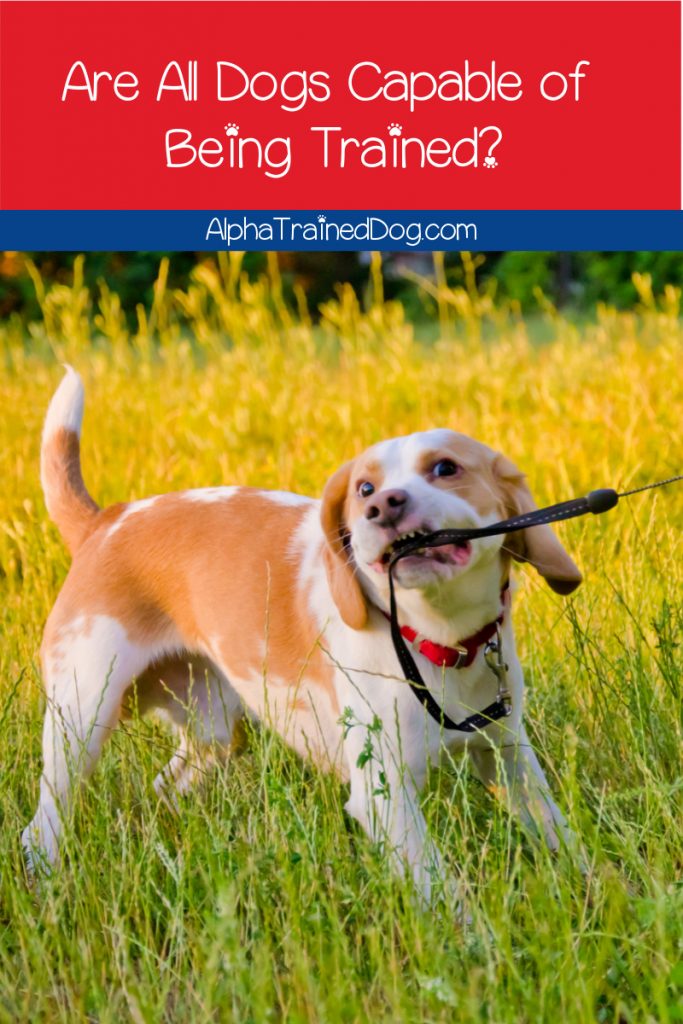Can all dogs be trained?
If you have a particularly stubborn breed, that question will definitely run through your head at some point.
Believe me, I know!
Read on to learn the answer, plus get some tips on training super challenging breeds.

Can All Dogs Be Trained?
The very short and super over-simplified answer is yes, for the most part, all dogs are trainable.
Now, of course there are exceptions. A dog with severe learning deficits, for example, may be nearly impossible to train.
Even then, though, if you’re patient enough and willing to think outside the box, it’s not impossible.
Like I said, that’s the short answer. For the long answer, we’ll look at different factors that make one dog more trainable than another.
Then, we’ll check out some tips for training the super tough cases.
Are smart dogs easier to train?

It stands to reason that smart dogs are easier to train than not-so-smart (I refuse to call any dog “dumb,”) breeds, right?
Wrong. While intelligence does play a role in how quickly your dog learns new commands, it’s not the only factor.
In fact, sometimes smart dogs are harder to train than their counterparts.
I happen to own one of the smartest breeds on the planet (a Pharaoh Hound), and she was remarkably challenging to train at first.
See, the smartest dogs typically come from the working, herding, and hound groups, all of which were bred to work independently.
In other words, they need to know how to make decisions on the fly, without constant feedback or direction from their humans.
The Dachshund, for example, was created to hunt badgers. Since he can’t very well take direction from his human when he’s underground, he has to be able to think for himself.
Once he’s back above ground, he can’t just turn off that “independent thinker” gene, so his people think he’s “dumb” and “untrainable” when he’s actually quite brilliant.
Now, some of the smartest breeds are among the easiest to train, but trainability and intelligence don’t always go hand-in-hand.
Let’s take a look at the factors that do make one dog more trainable than another. Don’t worry, it’s not a long list, as it really comes down to two main things.
Mental capacity
Mental capacity isn’t exactly the same thing as intelligence, so don’t go thinking I just contradicted myself.
The dictionary defines mental capacity as the “sufficient understanding and memory to comprehend in a general way the situation in which one finds oneself and the nature, purpose, and consequence of any act or transaction into which one proposes to enter.”
When it comes to dog training, that first half is what we’re looking at. Your dog needs to have a sufficient understanding of what you’re asking of him.
Likewise, he needs the memory skills required to connect all of the dots and learn that doing X leads to tasty treats while doing Y doesn’t.
Motivation
Along with the ability to comprehend and remember commands, your dog needs to be motivated to actually do so.
Food-motivated dogs are, by far, the easiest to train.
They’re perfectly happy to master all the commands you throw at them as long as you also keep throwing tasty tidbits.
People pleasers also top the list of “easy to train” dogs because they’re highly motivated by praise.
I had a German Shepherd and a Pit who were both major people pleasers. Both practically trained themselves!
On the flip side, dogs who really don’t care about pleasing you (I call them “what’s in it for me?” breeds) are a bit more challenging.
“What’s in it for me breeds” who also aren’t food motivated? Now, that’s where things get super tricky and inspire the question “can all dogs be trained?” in the first place!
I wasn’t really planning to make lists of easy or hard-to-train breeds because I feel that they’re misleading.
Every single dog is different, after all.
But, if you really want one, read on for a quick rundown of breeds that commonly top each list.
Which dog breeds are easiest to train?

Again, please remember that every single dog is different. Appearing on this list doesn’t guarantee an easy-to-train dog. That said, these breeds continually top the lists:
- Border Collie
- German Shepherd
- Poodle
- Golden & Labrador Retrievers
- Sheltie (Shetland Sheepdog)
- Doberman
- Rottweiler
- Corgi
- Schnauzer
- Papillon
Which dog breeds are hardest to train?
These dogs tend to rank among the most stubborn, earning them a reputation for being hard to train.

- Dachshund
- Greyhound (honestly, all sighthounds are challenging)
- Borzoi
- Siberian Husky
- Bullmastiff
- Chesapeake Bay Retriever
- Chow Chow
- Akita
- Beagle
- Shiba Inu
Okay, now that we know what makes some dogs more trainable than others, let’s look at tips for those challenging cases.
Tips for training “untrainable” dogs

I’m not going to give you a step-by-step guide to training so-called untrainable dogs.
There’s a reason why entire books are written on the subject, it’s not something easy to sum up.
I can, however, give you tips on how I trained my stubborn Pharaoh Hound.
1. Find their motivation
Step one in training any dog is to figure out what motivates them- be it food, praise, or both.
If your dog isn’t motivated by either, you’ll have to do a little more legwork.
What really gets her excited? Does she love when you bring home new toys? Take her for a walk? Play fetch with her?
Once you find that motivation, even the toughest dog becomes totally trainable.
2. Stay positive (literally)
I don’t just mean keep an upbeat and happy attitude while training(although that definitely helps, as dogs can sense when you’re annoyed).
I mean literally stick with positive reinforcement and reward training techniques.
Too often, owners of challenging breeds resort to negative training methods, like shock collars.
If (and that’s a big if) you manage to train them at all with these methods, it’ll only be because they’re terrified of getting hurt again.
It’s basically the equivalent of hitting a child to get them to behave.
3. Be reliable
Setting up a nightly routine with my dog is one of the smartest things I ever did.
Beforehand, she’d drive everyone nuts all night long, barking because she wanted us to get up and do things with her every last second.
I love my dog. I love spending time with her. Sometimes, though, I just want to veg out in front of the TV without getting barked at!
Now, we have a very specific timeline for activities at night.
We play her puzzle game after dinner, then a training game at 6, “dot” at 7 (laser pointer), and her final training game at 7:30.
I finish the last one by saying, “You did all the things, it’s time to settle now.”
Aside from a few “antsy” nights here and there, she settles in for the night and let’s us watch TV in peace.
4. Start without distractions
A distraction-free environment is vital to training a challenging dog.
With Freya, I kept trying to teach her recall when she was in the middle of hunting a squirrel.
Epic fail, especially since she’s a sighthound with an incredibly overpowering prey drive.
I’d chase her around with a piece of cheese, saying “Come, come, Freya, come,” and she ignored me.
See, while she’s definitely food motivated, her desire to hunt far outweighs her desire for cheesy goodness.
So, we worked on every new command inside, in a quiet living room free of all distractions.
Once she mastered a command, we took it outside.
Sometimes, her recall isn’t perfect, so she’ll never be allowed off-leash beyond our fenced-in yard.
However, it’s significantly easier to get her to come than it used to be, even when her arch-nemesis Sir Squirrel the 2nd (she finally defeated Sir Squirrel the 1st) is wagging his taunting tail at her.
5. Call in the pros
If the tips above just don’t work for you or you feel yourself losing patience, call in a professional trainer.
Sometimes, we just have to admit to ourselves that we’re not qualified to train our tough cases on our own.
There’s nothing wrong with that. After all, you’d call a plumber if you couldn’t fix a leak on your own, right?
Even if you do think you can handle training your tough case, I recommend consulting with an expert if your dog was abused in the past or shows signs of a learning disability.
Long story short, the answer to “can all dogs be trained” is still “yes” in my opinion. Some are just harder than others.



I can vouch for a husky being a bit stubborn. We have one and she is one total diva! She definitely does not listen but we love her just the same. I believe all dogs can be trained but some types of breeds may be trained a little differently than the others due to their strong-willed nature.